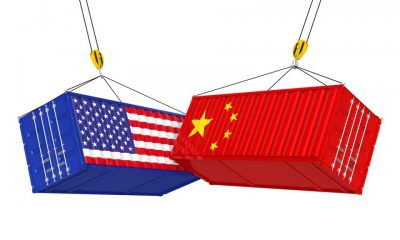Call It “Decoupling” or “De-risking”, US Economic War Against China Doomed to Backfire

All Global Research articles can be read in 51 languages by activating the Translate Website button below the author’s name.
To receive Global Research’s Daily Newsletter (selected articles), click here.
Click the share button above to email/forward this article to your friends and colleagues. Follow us on Instagram and Twitter and subscribe to our Telegram Channel. Feel free to repost and share widely Global Research articles.
***
At the G7 summit in Hiroshima, much was talking about “de-risking” from China – which seems to be the new preferred terminology. The summit joint statement said: “we are not decoupling or turning inwards. At the same time, we recognise that economic resilience requires de-risking and diversifying.” In the same spirit, US President Joe Biden, on May 21, stated: “we’re not looking to decouple from China, we’re looking to de-risk and diversify our relationship with [it].” The US state department describes “de-risking” somewhat more clearly as “the phenomenon of financial institutions terminating or restricting business relationships with clients or categories of clients to avoid, rather than manage, risk.”
Journalists Keith Johnson and Robbie Gramer in turn, writing for Foreign Policy, define de-risking this way: “decoupling refers to the deliberate dismantling and eventual re-creation elsewhere of some of the sprawling cross-border supply chains that have defined globalization and especially the U.S.-China relationship in recent decades.”
“De-risking”, it seems, is about reducing Chinese “control” of global supply chains without isolating it “too much” – however much that is. Diplomatic rhetoric aside, one should understand it as part of the larger context of economic nationalism and economic warfare, while the US considers pivoting to the Pacific. A recent development such as the UK joining the Trans-Pacific Partnership is also part of a deeper anti-Chinese Western strategy, as it is accompanied by other initiatives such as the AUKUS deal – the military alliance that has been described as the “Asian NATO”. Here, geopolitical and geoeconomic agendas converge. There are fractures within the Western bloc, though, as “strategic autonomy” gains momentum within Europe itself.
I’ve written before on how deindustrialization is increasingly seen today as a national security matter. While China appears to have turned geoeconomics into the very center of its geostrategic approaches (deriving political power from economic power), the US in turn has been weaponizing economic policies and the very world economy and financial system itself.
In today’s world, it is increasingly hard to insulate industries from geopolitical disputes. Beijing aspires to becoming a tech superpower, and the American Establishment simply won’t have it. This is the context of the current chip war, for instance, which is about geopolitics as much as it is about geoconomic competition. The blowback of this warfare is that it has been hurting key US allies, such as Taiwan itself. Washington’s economic policies in that regard can only aggravate the ongoing supply chain crisis and complicate the bottleneck, ultimately hurting the US itself. The United States may try to enforce a blockade of Chinese technology as much as it can, but supply chains remain hard to trace.
Despite all the talk about the wonders of the “post-industrial” world, manufacturing and industrialization still hold the key for the 21st century emerging powers and great powers alike. So-called “neoliberalism” is in fact quite dead, while “old-fashioned” protectionism, subsidies and procurement mandates are on the rise. Economic nationalism is once again relevant; amid the New Cold War, this means one should expect to see an increase in industry and trade wars, as one can already see with Biden’s own subsidy wars against Europe itself. Such a scenario can make economic warfare even more dangerous as it already is, for it potentially turns things into existential challenges for the interested parties. While so much is talked about “de-risking”, it might be particularly risky to corner a great power such as China like this.
As American investor Balaji Srinivasan has recently remarked regarding China, the US simply is not in a position of strength: the Asian giant remains the number 1 trade partner for a large part of the world. It has in fact a larger place in global trade than the US had even in the post-WW2 boom, and US geoeconomic strategy simply does not seem to grasp this hard truth, according to Matthew Pipes who is a managing consultant at the Krebs Stamos Group and also a Fellow at the Bitcoin Policy Institute.
As journalist Gavin Bade writes, in his Politico piece, Washington seems to believe the world can sort itself into “two trading groups”, one led by the US and the other led by China – something which did not come about even during the cold war years. As I have written, emerging powers such as Brazil, Egypt, Saudi Arabia, Indonesia and India are showing the world that a new age of non-alignment and multi-alignment has come to stay – these nations have been successfully avoiding the new cold war trap of “alignmentism”, while successfully pursuing their own interests.
American diplomatic pressures for alignment are thus doomed to backfire – if forced to “pick a side”, most countries may end up “decoupling” from the US instead.
*
Note to readers: Please click the share button above. Follow us on Instagram and Twitter and subscribe to our Telegram Channel. Feel free to repost and share widely Global Research articles.
Uriel Araujo is a researcher with a focus on international and ethnic conflicts.

